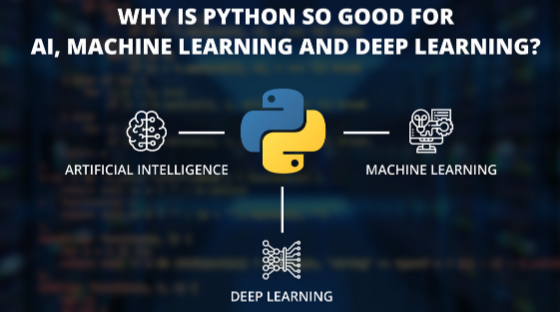Python is a programming language that may be used to create various programs. Developers believe it to be a fantastic alternative for projects involving Artificial Intelligence (AI), Machine Learning, and Deep Learning.
This article discusses Python’s popularity among programmers specialising in machine learning and deep learning. It also supports the suggestion that Python can be used for developing AI applications.
Table of Contents
Deep Learning, Machine Learning, And AI Understanding
Artificial Intelligence (AI) is any intelligence shown by a computer that might lead to a practical solution to a problem. Machine learning advances AI approaches by utilizing algorithms to analyze data, learn from experience, and reach more informed conclusions.
Deep Learning functions similarly but, among other things, may draw conclusions that resemble those of humans. It is possible to use carefully designed algorithms modeled after the human brain’s neural network.
The Benefits of Utilising Python in Machine Learning.
Many libraries and frameworks are included in it: The abundance of libraries and frameworks included with the Python language makes coding simple. This also saves a significant amount of time.
SciPy for more difficult calculations; SciPy, used for numerical computations; & Scikit, used to acquire data mining and analysis, are the three most commonly used frameworks.
These libraries use strong frameworks like CNTK, TensorFlow, and Apache Spark. These frameworks & libraries are necessary for activities involving machine and deep learning.
Simplicity:
Even for inexperienced programmers, Python projects benefit from their readable and understandable code. Python is one of the quickest programming languages for developing applications due to its simple syntax. It also allows the developer to assess algorithms without actually utilizing them.
Readable code is another need for collaborative coding. A difficult project could include a large number of individuals working together.
A well-known platform is Python. As a consequence, adding a Python developer to the team won’t be difficult. This means that after learning the basics of Python, a new developer might go to work on the project immediately away.
The Widespread Online Backing:
Python is an open-source programming language with strong support from several websites worldwide and excellent documentation. It also has a sizable and active developer community that assists at every development stage.
Most scientists use Python for Machine Learning, and Python organisations are home to the world’s brightest minds working on Deep Learning projects.
Quick Development
Python’s syntax is easy to understand and aesthetically pleasing. The availability of several libraries also makes it easier to design applications. A few lines of code may achieve a great deal when using pre-made solutions. Python may be used to build prototypes, which boosts output.
Versatile Integrations
Python-based projects may be linked to other systems developed in other coding languages. It becomes considerably easier when integrated with other AI projects in other languages.
Python may also be used for cross-language projects because of its portability and flexibility. Python’s flexibility makes machine learning model training easier for developers and system scientists.
Quick Code Tests
Python offers a wide variety of tools for code inspection and testing. Developers may quickly check the code’s correctness and quality.
Because AI projects take so much time, a structured environment for testing and bug-checking is necessary. Python is the ideal language since it offers these features.
Performance:
Some programmers claim that Python is quite slow compared to other programming languages. Python does provide the Cython alternative, even though speed is not one of its strong features. It is a specialised version of the Python language designed to produce efficient code similar to that of the C language.
Python and Cython have similar syntax. Thus programmers may similarly develop C extensions. Language ability is substantially improved with Cython.
Tools For Visualising Data:
Python has a large selection of libraries. These frameworks provide some useful visualisation tools. It is crucial to display data legibly by humans when using AI, machine learning, and deep learning. Python is a great option for developing this functionality because of this.
Using frameworks like Matplotlib, data scientists may generate charts, and scatter plot to better explain data and visualise it. The many APIs that Python makes possible also help in the visualisation process.
What Separates AI From Machine Learning?
Artificial intelligence (AI) refers to the emulation of human brain activity in computers via programming which in turn casused robots to behave and think just like people. There are now four categories of AI:
Responsive Devices
Reactive machines only respond to current situations. Sadly, they won’t depend on the information they learned or can retain. Such choices are not feasible. Maps and other things that need forward reactive machines may take preparation. Their observations are focused on the real world.
Mind-Body Theory
Artificial intelligence is the technology that allows computers to communicate with beings and products more effectively. These might be self-driving vehicles that can anticipate the actions of both drivers and pedestrians.
Small Memory
It is the kind of AI that gains knowledge based on prior observations and experiences. Limited memory employs pre-programmed data in addition to the historical and observational previous knowledge to forecast and categorise (especially if the task is complex). Let’s use self-driving automobiles as an example. For accurate navigation, these vehicles keep track of recent speed, distance, speed limit, and other information about other vehicles on the road.
Self-Conscious
Self-aware robots may recognise their internal states as well as the emotions and actions of others. This kind of AI has to be improved and developed. Of course, you’ve heard of clever, perceptive robots, but such machines still don’t have human abilities.
Conclusion
Although many other languages may be used for AI projects, Python is still the finest and has to be given much thought. It may be used with other well-known tools in the developer’s workflow.
Python is a popular programming language developers use nowadays for deep learning and machine learning applications. machine learning courses for beginners, are available on Great Learning












